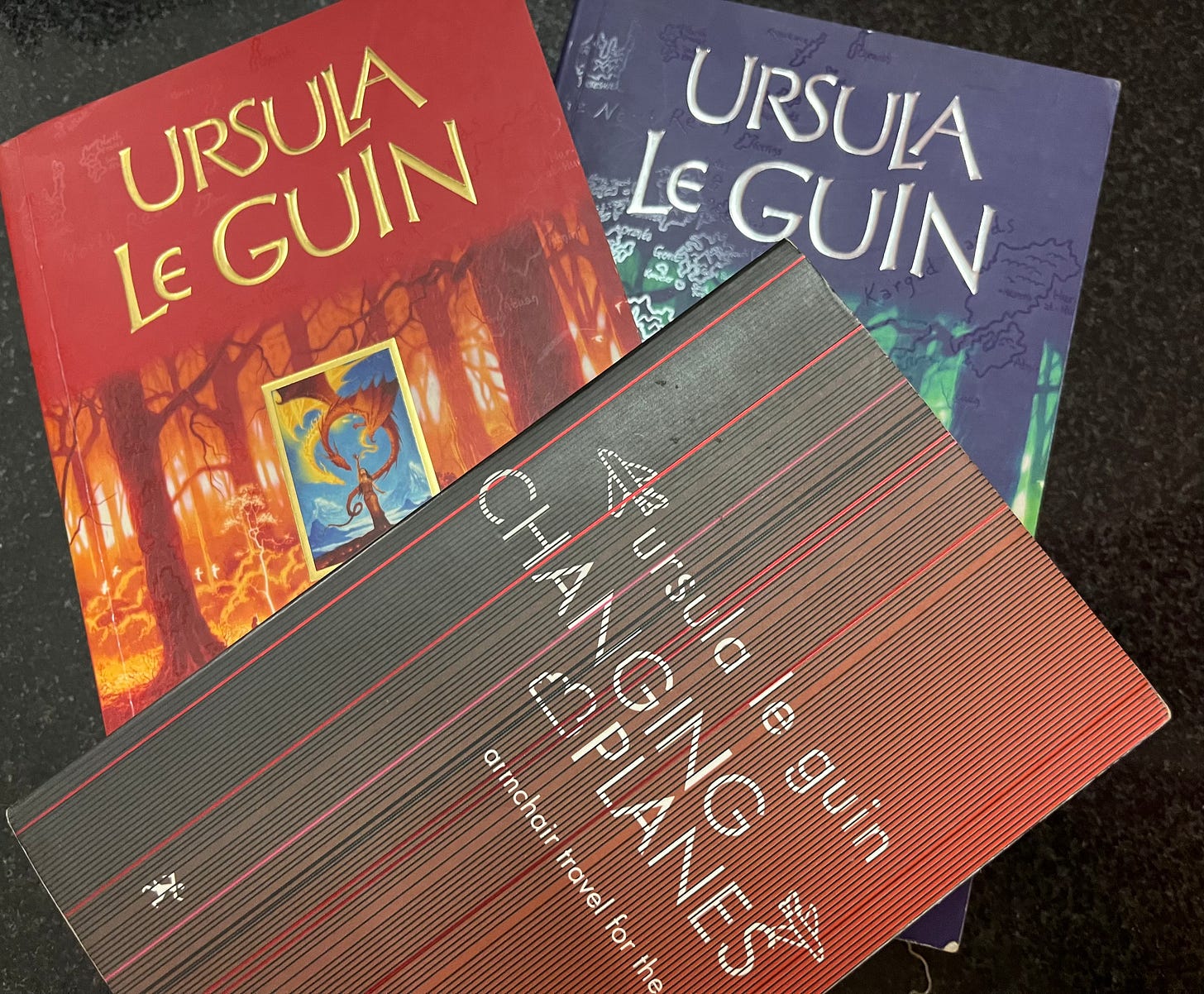For the past month or so I’ve been dwelling in the memories and meanderings of a wizard of our times, someone whose words—and worlds—have built and housed magic of the most useful kind. That which makes us think, and opens pathways to ideas so preposterous that the only way to deal with them is to take them seriously.
Every year, I teach a course that [ostensibly] is about understanding how the digital has permeated our lives, running screens through our relationships and notions of self, filtering the world through algorithms and designed interfaces, making and remaking our social, cultural, political, and professional worlds. Into the mix of academic and semi-popular readings there’s one I throw in for effect, and I’m never quite sure how it will land. She Unnames Them, a short story by the science fiction and fantasy writer Ursula K Le Guin (you can listen to the author read it here.) sets the scene for [possibly] the much more puzzling Cyborg Manifesto by Donna Haraway, a contested but essential reading for anyone developing a feminist critique of the Internet. My goal is to get my students thinking about the power of names and naming. Or words and the realities they build, and often cement. For words are the starting points for the code that constructs the digital.
I started early in the new year listening to Le Guin’s work being read aloud—her book of essays, Dancing at the Edge of the World—engaging, as I drove through the messy urban wonder that is my city, with her ideas on gender, on humanity, on nature, on the remarkable stupidities and possibilities of modern life as we have made it. She notes in the introduction to the book, “I have decided that the trouble with print is, it never changes its mind.” But through the book, in annotation upon annotation, she revisits her mind as it was in the past and proceeds to change it, acknowledging where she got things wrong, noting where she might have put things better. or even where she is happy to completely let go of an assertion. Rather than simply revise and republish, she revises with full transparency, giving the reader (or listener, in my case) the benefit of seeing the evolution in her thinking. Even as the essays serve as lessons for the hopeful writer, guidance for those seeking gender justice, openings for new ways of thinking about the relationship between sentient beings, for me, they are an affirmation that the writing life can matter, that words do matter.
“To me, words do make magic, they make something new...just like a potter making a pot...I see my job as holding doors open, or opening window...I have no idea who will walk through those doors, or look through the windows...my responsibility is to keep the mind open”.
Her words, in her voice, begin each episode of the podcast series Crafting with Ursula, lovingly and meticulously curated and hosted by writer and literary critic David Naimon. Rippling under her voice is a melody that recalls a forest brook, from her own co-produced Music and Poetry of the Kesh. The twelve-part series, which was launched in 2022 with an episode dropping each month, features extended conversations with writers who have been influenced by Ursula in some way, through interaction with her as an artist and an individual. From the first conversation, with Becky Chambers on Creating Aliens and Alien Worlds, to the last, with Neil Gaiman on Word Magic & the Power of Telling Stories, these are journeys not only through Le Guin’s worlds but also excursions into the complex politics of language, gender norms, anthropocentrism, even climate change. Listening to Julie Philips talking about the Writing Mother, and the difficulties that women face, even today, of claiming a writerly life or having to choose between that and domesticity, is sure to resonate with many a female writer.
There’s more of Ursula (three long interviews with her) on the Between the Covers podcast of which this series is a part, along with many other literary conversations.
The podcast made me go back to my bookshelves and pull out my own small collection of Le Guins, among them a favourite that I was thrilled made the lists of several of the writers featured in the podcast—Changing Planes. I bought it, appropriately enough, at an airport bookshop that for once seemed to have more than the usual bestsellers. Like stepping into the no-person’s neither-earth-nor-sky space of the terminal gate, moving from the contents page to each of the short stories takes you into an alternative world where the rules are different, where we are no longer constrained by the social and cultural norms that bind us into often toxic behaviours. It makes you wonder, like so many of Ursula’s stories do, who makes those rules, who do they serve, and what would it take to change them?
Using words would be a start.



